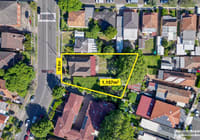
Roberts will expand into residential builds: CEO Emma Shipley
NSW builder Roberts will expand into residential construction – a sector it has avoided over the first eight years of its life – and widen the scope of projects it is willing to take on under the financial backing of new owner Arada, chief executive Emma Shipley said.
The Roberts Co NSW business, which since its founding by Rich List owner Andrew Roberts in 2017 has focused on commercial construction and government and steered clear of apartments, would also consider projects worth less than the $200 million limit it previously set, she said.
“I’m repurposing the business,” Shipley told The Australian Financial Review. “I’m happy to look at anything from $100 million to $1 billion.”
 The business will expand its horizons under new ownership: Roberts CEO Emma Shipley.
The business will expand its horizons under new ownership: Roberts CEO Emma Shipley.The decision by Roberts to sell his eponymous contracting company and exit commercial construction, a sector he grew up in, has triggered a shake-up in Australian contracting and placed another of the country’s large builders – Multiplex, which his father John Roberts founded – in foreign ownership.
Australia’s chronic housing shortage and lack of capacity in the sector to build the volume of homes the country needs – which is already prompting some developers to scale back their ambitions – creates an opportunity for the company to expand into residential work.
But even with a balance sheet replenished by United Arab Emirates-based Arada, which will this week take ownership of the Sydney-based company, it would not accept contracts with the level of risk that caused its Victorian arm to fail, Shipley said.
“I am only prepared to do work where we have the right project for us as a builder, and we have the right client and the right contractual conditions,” she said.
A spokeswoman for Arada said the company would not comment before the transaction settled.
And that lays bare the risks that remain for all contractors, even foreign-owned ones – that they run on razor-thin margins.
Jon Davies, heads the Australian Constructors Association, an industry grouping of the largest commercial and infrastructure contractors, of which Roberts Co is a member. He told the Financial Review that the sale of Roberts Co NSW – weakened by the financial support it provided to its Victorian arm, which went into administration last month – was symptomatic of the struggles the sector as a whole faces.
“It continues to demonstrate the financial fragility of the industry and this problem is just not going away,” he said.
“We continue to see company after company of all sizes go under or find themselves in financial difficulty.”
The latest figures from corporate regulator ASIC show construction-industry insolvency appointments were up almost 14 per cent at 2725 in the financial year to 6 April, from 2398 to end-April last year.
This required clients – particularly public-sector clients – to agree to pay more, be transparent in the way they assessed bids and to pay promptly so that contractors, supplies and subcontractors didn’t end up bankrolling projects, Davies said.
“We’ve got to try to find a way to raise profit margins,” he said.
“You can’t have a healthy industry operating on 2 to 3 per cent profit margins. All it takes is one issue and your profit’s wiped out, your contingency is wiped out, and you’re staring at a big loss.”
Shipley said she was willing to take steps her predecessors weren’t willing to make.
“Their remit was only jobs over $200 million,” she said. “I am very prepared to do work under $200 million. I am very prepared to work in residential. But at the end of the day we need the right contractual conditions.”
In the residential sector, the right contractual conditions would only likely come from projects worth $400 million or more, Shipley said. But not even that is a guarantee – in suburban Melbourne’s Footscray, the company’s now-in administration Victorian business was working on a $450 million build-to-rent residential project for Canada’s Oxford Properties and Investa.
The new business, which will also trade under the Roberts name, will not go into every sector, Shipley said, repeating one exclusion she emphasised when taking up the CEO role in January.
“I want to withdraw from the defence market,” she said.











